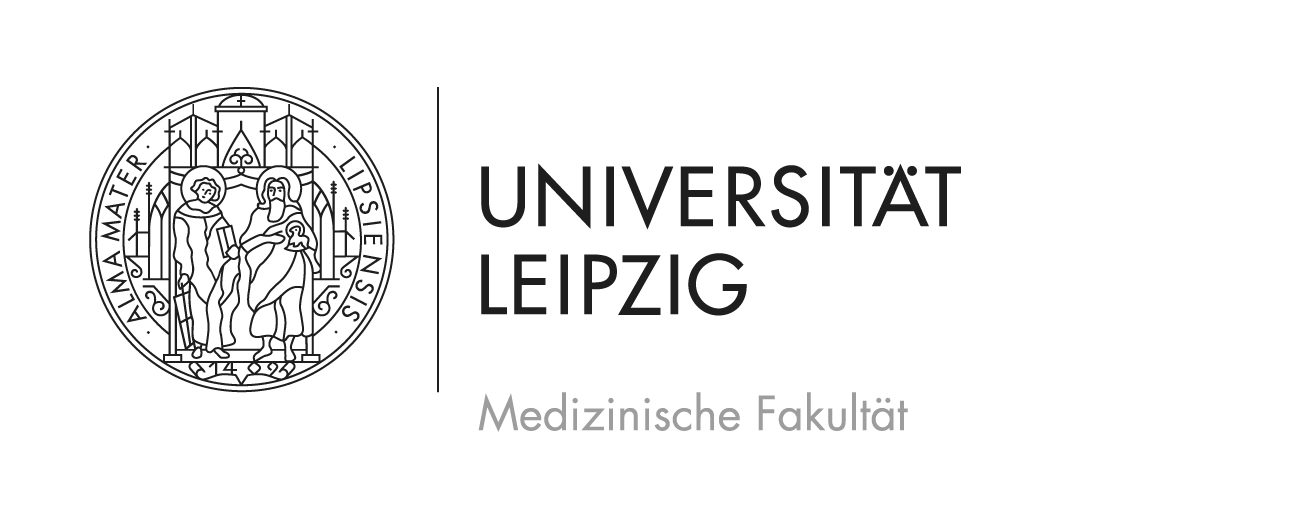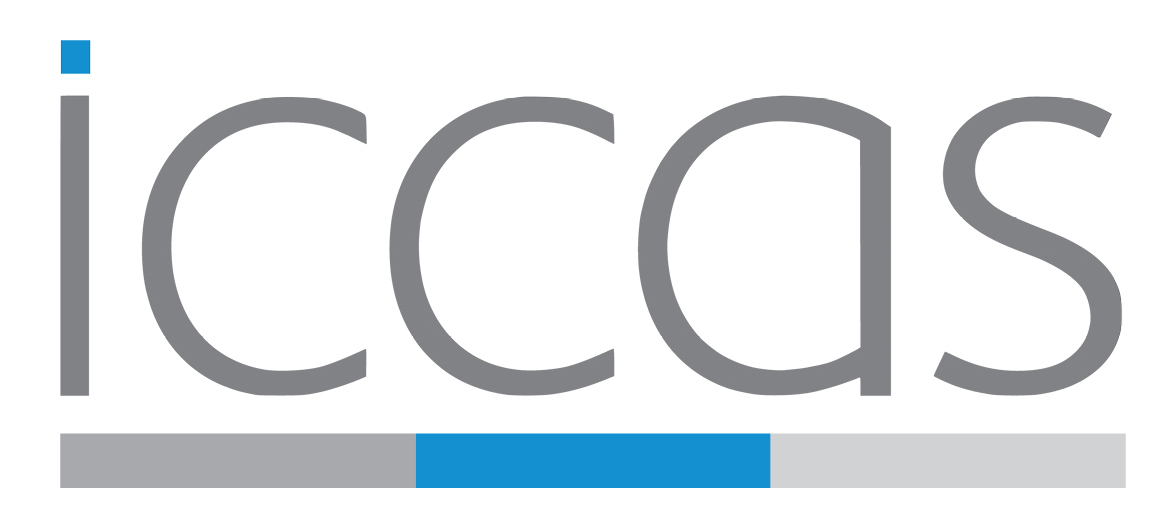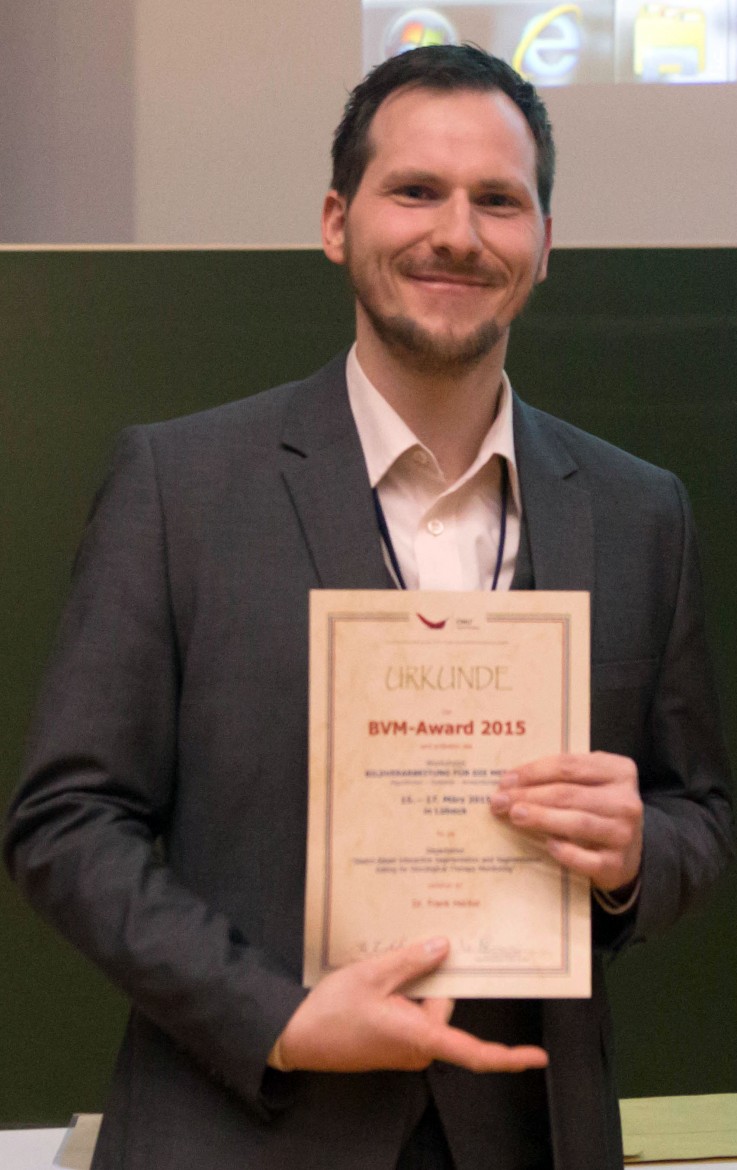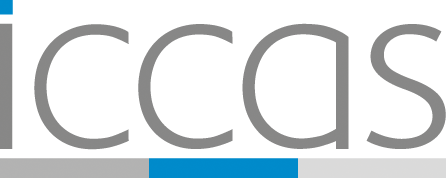25.03.2015
 BVM-Award für Dr. Frank Heckel
BVM-Award für Dr. Frank Heckel
Auf dem diesjährigen Workshop Bildverarbeitung für die Medizin (BVM) in Lübeck wurde Dr. Frank Heckel für seine hervorragende Dissertation mit dem BVM-AWARD 2015 ausgezeichnet. Bevor der Diplominformatiker seinen Preis entgegennahm, stellte er in einem Vortrag die wesentlichen Ergebnisse seiner Arbeit zur genaueren und reproduzierbareren volumetrischen Vermessung von Tumoren in Computertomographiedaten vor. Die entwickelten Verfahren unterstützen Radiologen bei der Beurteilung der Wirkung einer Chemotherapie.
Für den Gastwissenschaftler vom Fraunhofer MEVIS ist es bereits der zweite Preis, den er für seine Dissertation „Sketch-Based Interactive Segmentation and Segmentation Editing for Oncological Therapy Monitoring“ mit nach Hause nehmen darf. Im September vergangenen Jahres war er Gewinner des im Bereich Medizinische Bildverarbeitung begehrten Karl-Heinz-Höhne Preises.
Dr. Frank Heckel received the BVM-AWARD 2015 for his outstanding dissertation at this year’s workshop on Image Processing for Medicine (BVM) in Lübeck. Before the award ceremony the guest researcher from Fraunhofer MEVIS presented essential results of his doctoral thesis on reproducible volumetric measurement of tumors in computer tomography data. The methods support radiologists in assessing the effect of chemotherapy.
This is already the second prize for Heckel’s dissertation „Sketch-Based Interactive Segmentation and Segmentation Editing for Oncological Therapy Monitoring“. Last year in September his was a winner of the MedVis-Award.
16.03.2015
 Posterbeitrag auf der SPIE Medical Imaging 2015 in Orlando (USA)
Posterbeitrag auf der SPIE Medical Imaging 2015 in Orlando (USA)
16. März 2015
Bernhard Glaser (MAI) stellte auf der diesjährigen SPIE Medical Imaging Konferenz in Form einer Posterpräsentation seine wissenschaftliche Arbeit zur Thematik der multisensorischen Identifikation von chirurgischen Instrumenten vor. Besucher erhielten Einblicke in die aktuellen Forschungsergebnisse des Diplominformatikers zur Erkennung von chirurgischen Instrumenten auf dem Instrumententisch und vor allem zu deren Qualitäts- und Größenunterschieden. Die Resonanz auf den Beitrag war sehr gut, es kam zu vielfältigen Diskussionen und wertvollen Anregungen.
Auf der SPIE Medical Imaging können sich Besucher über die weltweit neuesten Entwicklungen in den Bereichen digitale Bildverarbeitung, computergestützte Diagnose und Therapie sowie neue Untersuchungsverfahren informieren. Themen wie Big Data im Zusammenhang mit Cloud Computing und Machine Learning waren auf der Konferenz, die in Orlando (USA) stattfand, breit vertreten.
16 March 2015
Bernhard Glaser (MAI) informed with a poster presentation his scientific work on multi-sensor identification of surgical instruments at this year’s SPIE Medical Imaging Conference. Visitors was given an insight into the computer scientist’s current research results on the recognition of surgical instruments at the instrument tray and especially on their quality and similarity metrics. The resonance was very good. There were diverse discussions and valuable proposals.
Visitors of the SPIE Medical Imaging can obtain latest information about worldwide developments in the fields of digital image processing, computer-aided diagnosis and therapy as well as new investigative procedures. Topics such as Big Data connected with Cloud Computing und Machine Learning were widely represented.
26.02.2015
 PD Dr. Thomas Wittenberg vom Fraunhofer IIS eröffnet ICCAS-Seminar 2015
PD Dr. Thomas Wittenberg vom Fraunhofer IIS eröffnet ICCAS-Seminar 2015
Am 24.03.2015 startet das ICCAS seine diesjährige Seminarreihe mit einem öffentlichen Vortrag von PD Dr.-Ing. Thomas Wittenberg vom Fraunhofer-Institut für Integrierte Schaltungen IIS, Erlangen. Der Wissenschaftliche Leiter der Abteilung „Bildverarbeitung und Medizintechnik“ sowie Leiter der Forschungsgruppe „Biomedizinische Forschung“ am IIS wird zum Thema „Computergestützte Bildverarbeitung und Mustererkennung für die diagnostische und interventionelle Endoskopie“ referieren. Wir freuen uns auf den spannenden Beitrag über neueste Möglichkeiten computergestützter endoskopischer Verfahren und Anwendungen, zu der wir alle Interessenten herzlich in die Liebigstraße 20 einladen.
Datum: 24. März 2015
Uhrzeit: 17-18 Uhr
Veranstaltungsort: Leipzig University Hospital, Haus 4, Seminarraum 0015/0016 „Glaskasten“, Liebigstraße 20, Leipzig
Inhalt: In diesem Beitrag werden neue Möglichkeiten skizziert, Inhalte endoskopischer Bilder automatisch auszuwerten und die daraus extrahierte Information für die Dokumentation, Diagnose sowie die Therapie zu nutzen.
Einsatzmöglichkeiten dieser neuen Verfahren der digitalen Bildbearbeitung und -analyse sind die automatische Bildverbesserung, Bildrektifizierung rotierter Ansichten, neue Möglichkeiten der Ansichtenerweiterung durch Panoramaendoskopie und Überlagerung endoskopischer Ansichten mit präoperativen Bild- und Planungsdaten, sowie die Computer-Assistierte Detektion von Tumorvorstufen und Tumoren (CADe) und die Computer-Assistierte Diagnose (CADx). Da diese neuen Möglichkeiten der Endoskopie inhärent mit der Nutzung von Computern verbunden sind, können diese Verfahren auch als Computer-integrierte Endoskopie bezeichnet werden.
Link – Short Vita PD Dr. Thomas Wittenberg
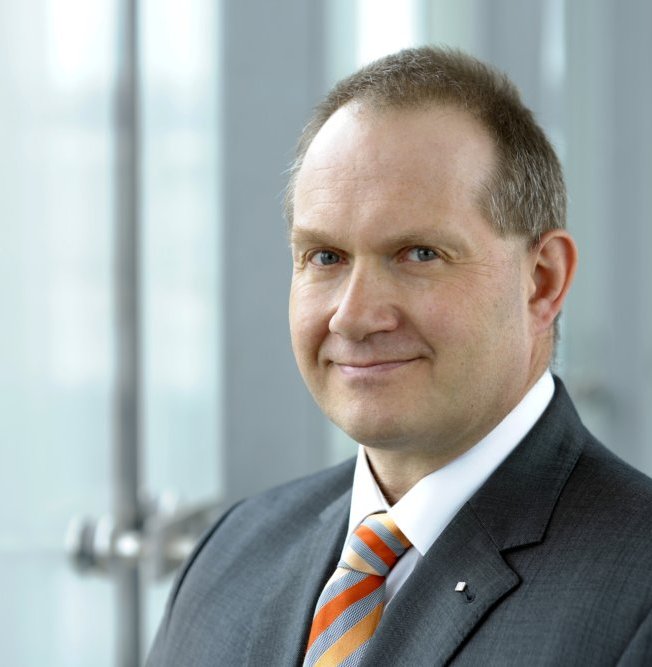
On 24 March 2015, ICCAS will open this year’s ICCAS-Seminar with a public lecture by PD Dr.-Ing. Thomas Wittenberg from the Fraunhofer Institute for Integrated Circuits IIS, Erlangen. The chief scientist of the Image Processing and Medical Engineering Department and Group Manager of „Biomedical Research“ at IIS is giving a lecture on „Computer-supported imaging and pattern recognition for diagnostic and interventional endoscopy“. We are looking forward to an exciting contribution about newest technological possibilities of computerized endoscopic procedures and applications. All interested parties are warmly invited to take part in Liebigstraße 20.
Date: 24 March 2015
Time: 5-6 pm
Venue: Universitätsklinikum Leipzig, Haus 4, Seminarraum 0015/0016 „Glaskasten“, Liebigstraße 20, Leipzig
Content: New possibilities to automatically analyze the content of endoscopic imagery and the application of the extracted information for enhanced documentation, diagnosis and treatment are sketched. The field of applications of such digital image processing and analysis include automatic image enhancement, rectification of rotated images, new possibilities of view extension (augmentation) using panorama endoscopy and the overlay of endoscopic views with pre-operative imagery and planning data; and computer aided detection of dysplasia and tumors (CADe) as well as computer-assisted diag¬nose (CADx).
As these new possibilities of endoscopy are inherently coupled with the use of computers, these new endoscopic methods and applications can be referred to as computer-integrated endoscopy.
02.02.2015
 Deutsches Ärzteblatt informiert über die ICCAS-Forschung am Digitalen Patientenmodell
Deutsches Ärzteblatt informiert über die ICCAS-Forschung am Digitalen Patientenmodell
02. Januar 2015
In der Januarausgabe des Deutschen Ärzteblattes gibt ICCAS-Nachwuchsgruppenleiterin Dr. Kerstin Denecke Auskunft über den derzeitigen Forschungsstand sowie Ausblicke der Forschungsgruppe „Digitales Patienten- und Prozessmodell“. Deren Wissenschaftler arbeiten seit zwei Jahren in enger Zusammenarbeit mit Medizinern des Universitätsklinikums Leipzig an der Erstellung modellbasierter Systeme, die ärztliche Therapieentscheidungen erheblich unterstützen können.
15.01.2015
 OR.NET-Workshop am ICCAS
OR.NET-Workshop am ICCAS
15. Januar 2015
Ende des Jahres 2014 fand am ICCAS ein weiterer wichtiger Workshop zu Teilprojekten des Verbundprojektes OR.NET – sichere und dynamische Vernetzung in Operationssaal und Klinik – statt. Im Focus der Teilnehmenden aus Industrie und Forschung standen die IT-Integration und Vernetzung im Operationssaal.
Der zweitägige Workshop, dessen Leitung Max Rockstroh innehatte, beschäftigte sich umfassend mit der Modellierung von medizinischen Geräten und Softwaresystemen nach internationaler Normung. Im Vordergrund standen die Vorbereitung der Implementierung der Demonstratoren sowie die Unterstützung von Standardisierungsmaßnahmen.
An dem seit Ende 2013 am ICCAS entwickelten klinischen Demonstrator sollen zum Ende der Projektlaufzeit im August 2015 beispielhafte Implementierungen zur sicheren und dynamischen Integration und Vernetzung von Medizinprodukten – mit und ohne Echtzeitanforderungen untereinander und mit IT-Systemen im OP-Umfeld – möglich werden. Diese sollen anschließend von Klinikbetreibern als auch von Ärzten und dem OP-Personal evaluiert werden.

05.01.2015
 ICCAS 2014 – Der aktuelle Jahresbericht gibt Auskunft
ICCAS 2014 – Der aktuelle Jahresbericht gibt Auskunft
05 January 2015
The current ICCAS Annual Report is now online available. Interested persons receive detailed information about the particular projects – structured by the research areas of ICCAS – and the achievements and results of the scientists in 2014.

16.12.2014
 ICCAS lud ein zu Statusseminar und Beiratsevaluierung 2014
ICCAS lud ein zu Statusseminar und Beiratsevaluierung 2014
16 December 2014
On 8th December 2014, Professor Jürgen Meixensberger opened the ICCAS status seminar and the advisory committee meeting 2014 with a welcome speech to the employee and invited guests, which included the ICCAS-board- and advisory board members from science and industry as well as the Vice Dean of the Leipzig Medical Faculty Professor Ingo Bechmann. Afterwards he handed over to Professor Andreas Melzer, who has been Director of the ICCAS since September 2014. Prof. Melzer presented intentions for the further development of the ICCAS-concept, which includes a stronger interaction with other medical research institutions and a growth of cooperation with the industrial sector. Furthermore, he explained the inclusion of his research area MR-guided Focused UltraSound (MRgFUS) in the ICCAS research landscape. Prof. Bechmann praised the research of ICCAS and assured support by the Leipzig Medical Faculty for future projects. ICCAS also received much appreciation for the achievements already made from the clinics of the Leipzig University Hospital.
This was followed by a round of presentations of the project leaders of all ICCAS research fields. Much has been achieved in 2014, but the year 2015 holds new challenges. Projects such as Standards, Patient Simulation Systems and Defect Classification of the Cervical Spine came to an end and new projects were presented, e.g. ONCOCONTROL – which will continue the successful development in the field of information- and management systems in tumor therapy. The guests were informed about the research state of selected projects on the basis of life-, multimedia-, Powerpoint- and poster presentations. The diversified event which offered many issues for discussion about benefits and applications of high-tech systems, not only in the operational area, ended with the meeting of the ICCAS advisory committee. Every year, its highly qualified experts from science and industry evaluate the research of ICCAS.
Thanks to all guests and employees for their successful contributions, constructive discussions, ideas and suggestions, which ICCAS will take in its 10th year of existence.
[nggallery id=19]
 Auftakt – ICCAS Fraunhofer Kolloquium
Auftakt – ICCAS Fraunhofer Kolloquium
Am Freitag, dem 19. Dezember 2014, findet um 9:00 Uhr im ICCAS-Seminarraum die Auftaktveranstaltung zu einem Kolloquium mit Vertretern der Fraunhofer Institute statt. Erster Vortragender dieser Vorlesungsreihe wird Dipl.-Ing. Steffen Tretbar sein. Der Leiter der Abteilung „Medizinischer Ultraschall“ am Fraunhofer Institut für Biomedizinische Technik (IBMT) beleuchtet das Thema “Neue Perspektiven des medizinischen Ultraschalls“.
08.12.2014
 Prof. Melzer ist Referent im “Klinisch Neurowissenschaftlichen Kolloquium”des UKL
Prof. Melzer ist Referent im “Klinisch Neurowissenschaftlichen Kolloquium”des UKL
Am Dienstag, dem 09.12.2014 um 17:00 Uhr, spricht ICCAS-Direktor Prof. Andreas Melzer im „Klinisch-Neurowissenschaftlichen Kolloquium“ des Universitätsklinikums Leipzig (UKL) zum Thema „MR – geführter fokussierter Ultraschall zur Behandlung neurologischer/psychiatrischer Erkrankungen: Stand der Technik und Ausblick“.
Die Veranstaltung, deren Gastgeber die Klinik und Poliklinik für Neurochirurgie des UKL ist, findet im Haus 4 (Innere und Operative Medizin; Neurologie; Radiologie), im Seminarraum 0015/0016 in der Liebigstraße 20 statt.
Link zum Flyer des Veranstaltungsprogramms im Wintersemester 2014/15

29.10.2014
 ICCAS Workshop ‘Standards and Model Guided Medicine’
ICCAS Workshop ‘Standards and Model Guided Medicine’
29 October 2014
In the middle of October, Professor Heinz U. Lemke launched the ICCAS workshop Standards and Model Guided Medicine. Renowned scientists, such as Kevin Claeary, research professor and bioengineer at Sheikh Zayed Institute for Pediatric Surgical Innovation in Washington DC and Emanuele Neri, professor for radiology at Pisa University Hospital, Prof. U. Meyer, from the company MT2IT and ICCAS-director Professor Andreas Melzer participated in this international event. The agenda included themes which are important for the further development of information management and system integration in the digital operating room. The participants exchanged their knowledge about technical frame conditions and approval issues regarding the implementation of concepts in the field of model-based automation. Further topics of discussion were the integration of standardizations in future projects and the role of ICCAS within the lighthouse project OR.NET.
